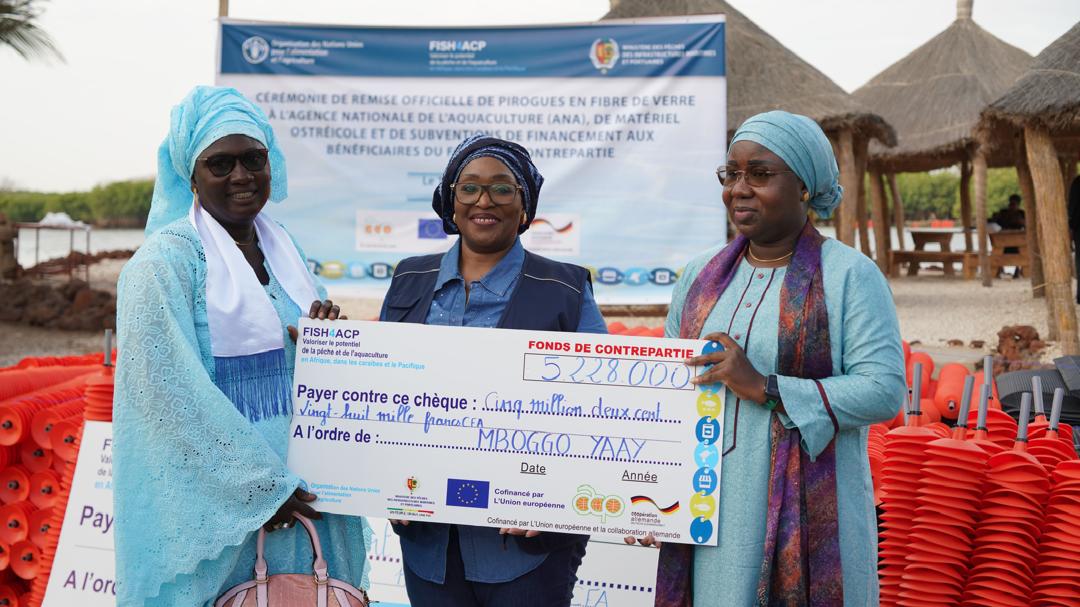Joal, Senegal – On Thursday, July 10, the Food and Agriculture Organization of the United Nations (FAO), through the FISH4ACP project, organized an official ceremony in Joal to hand over grants, modern equipment, and materials worth 213 million CFA francs. These were allocated to women’s groups, oyster sector enterprises, and the National Aquaculture Agency.
The ceremony brought together numerous participants, including government representatives, local authorities, community members, and beneficiaries from all regions of Senegal. It was co-chaired by Dr. Fatou Diouf, Minister of Fisheries and Maritime and Port Infrastructure, and Ms. Bintia Stephen-Tchicaya, Acting Sub-Regional Coordinator for West Africa and FAO Representative in Senegal.
During the event, the National Aquaculture Agency (ANA) received three motorized fiberglass canoes to strengthen its operational capacity. Additionally, eighteen economic interest groups (GIE) and enterprises benefited from financing grants totaling 170 million CFA francs and modern oyster farming equipment as part of a matching fund aimed at boosting local investment and empowering actors in the sector.
The matching fund is a new mechanism developed by FAO to stimulate local economic development by engaging stakeholders through financial contributions that will help them improve access to knowledge, financing, markets, and enhanced practices and technologies throughout the value chain—from production to marketing.
“The acquisition of these motorized fiberglass canoes, valued at 43 million CFA francs, for the National Aquaculture Agency will support the modernization dynamics of the oyster sector. This will undoubtedly strengthen the monitoring of oyster parks and provide close guidance to actors on production and processing techniques and technologies. We sincerely hope ANA will mobilize technical relay agents or volunteers to achieve the expected results,” declared Ms. Bintia Stephen-Tchicaya.
She added that FAO, through two projects—FISH4ACP and STDF—“driven by a common commitment to acquiring knowledge on the sanitary quality of various shellfish harvesting zones and the assessment of the oyster farming potential in Senegalese mangroves and lagoons, has developed a strong synergy to benefit the sector.”
“Soon, the oyster purging basin in Almadies (Dakar) and two oyster processing units in Toubacouta will be upgraded to benefit national and international market actors,” she announced.
The technical and material support provided by FAO will improve oyster farming practices, reinforce compliance with sanitary standards, facilitate access to new markets, and generate greater added value throughout the production chain.
“This gesture, which we warmly acknowledge, is part of a strategic approach to modernize, include, and sustain our fisheries sector. It is not merely material or financial support but a concrete commitment to improving value chains in fisheries and aquaculture overall, and the oyster sector in particular,” declared Dr. Fatou Diouf.
This initiative is part of a shared vision of blue growth, combining local innovation, climate resilience, and inclusive economic development.
FISH4ACP has also facilitated the creation and support of the National Network of Oyster Value Chain Actors (RENACVAH). “Thanks to FAO’s decisive support, the network has been formalized and made significant progress in its structuring and development through dedicated support, capacity building, training sessions, exchange visits, and participation in national and international fairs,” said Fatou Niang, Secretary-General of RENACVAH.
Development partners, notably the European Union (EU) and the German Federal Ministry for Economic Cooperation and Development (BMZ), remain fully committed to building a sustainable, inclusive, and competitive oyster sector—a key driver of food security and job creation.
FISH4ACP is an initiative of the Organisation of African, Caribbean and Pacific States (OACPS). It aims to ensure the sustainability of fisheries and aquaculture value chains in Africa, the Caribbean, and the Pacific.
Implemented by FAO, this program is funded by the European Union and the German Federal Ministry for Economic Cooperation and Development (BMZ). It supports twelve countries in Africa, the Caribbean, and the Pacific to make their value chains more productive, inclusive, and sustainable.
In Senegal, the oyster sector was selected for its economic, environmental, and social potential—particularly regarding women’s empowerment, sustainable natural resource management, and local social cohesion.
Since its launch in 2021, FISH4ACP has supported the development of a shared vision for the sector, accompanied by a ten-year upgrading strategy (2021-2031) for this value chain. An action plan based on four main strategic axes guides the implementation of the project’s activities.
Source: FAO


